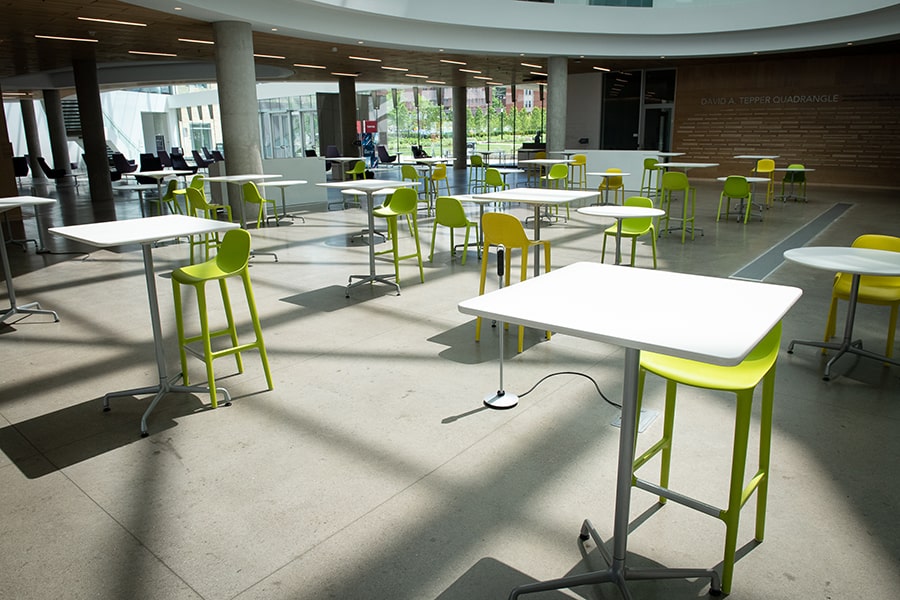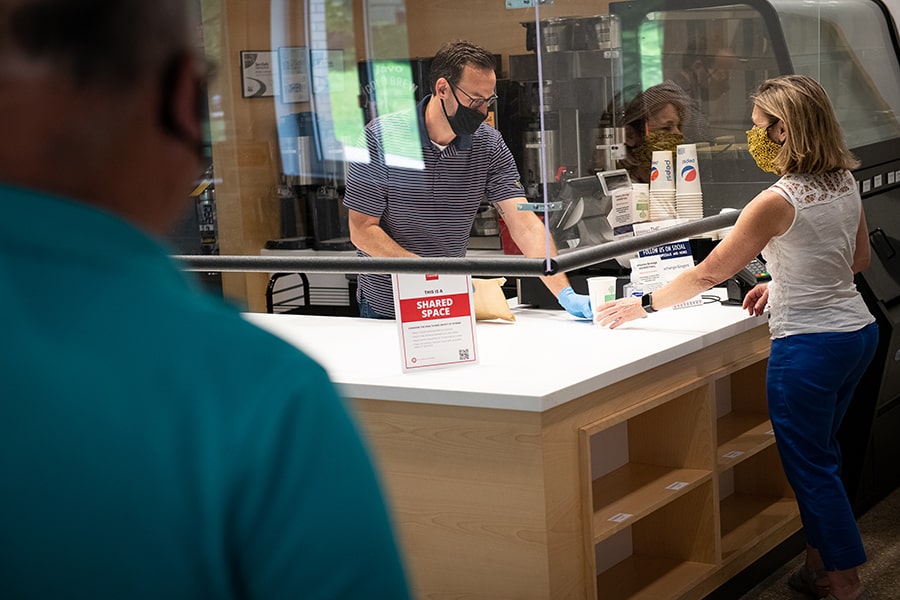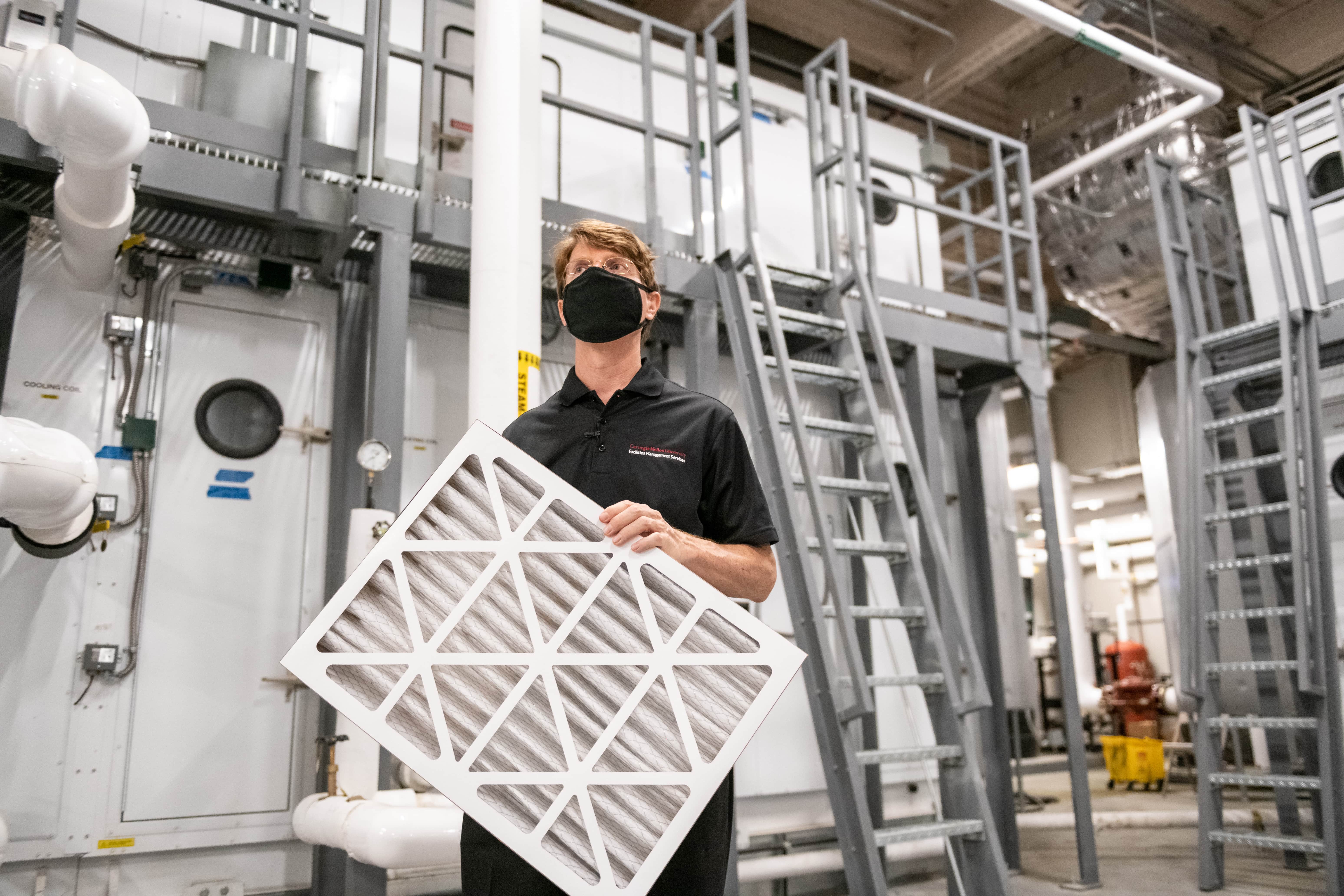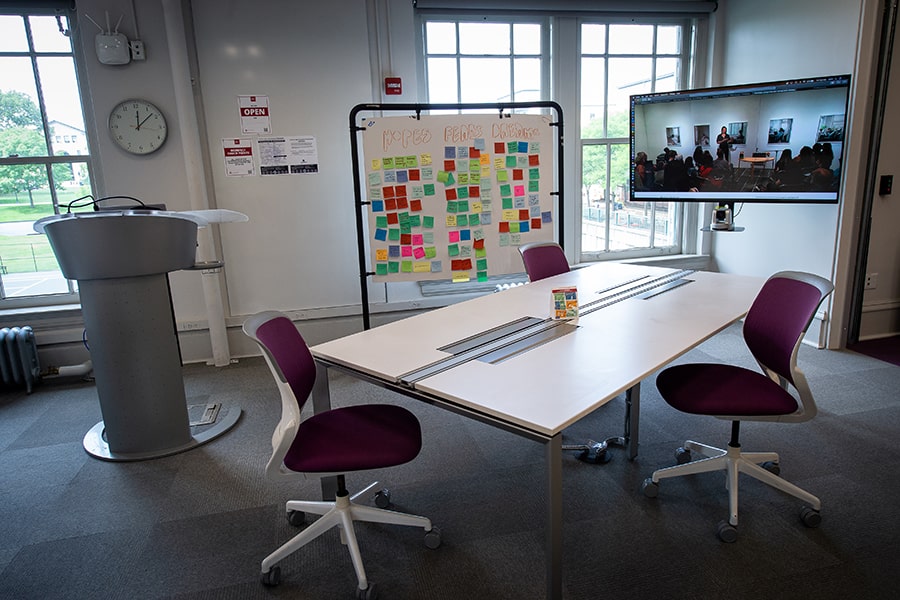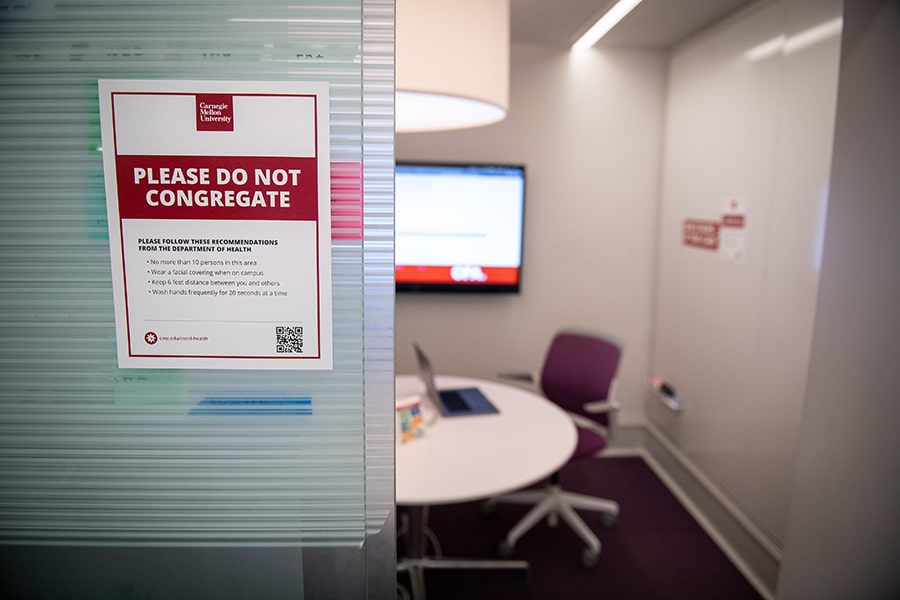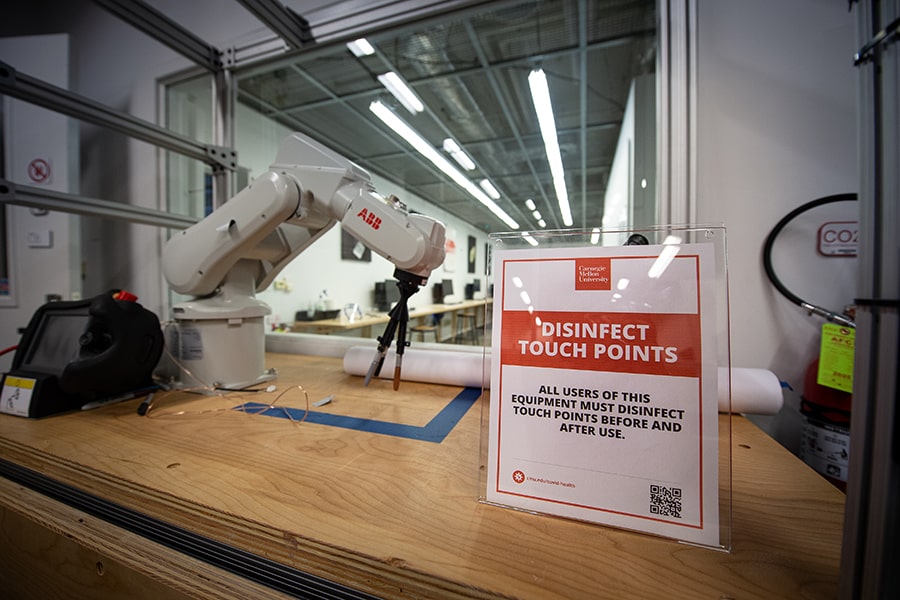Campus Will Be Different This Fall
By Bruce Gerson
If you are planning to return to campus for the fall semester, you’re probably wondering what things will look like when you get back. What will classrooms be like? What will work be like? And, what about campus life?
One answer applies to all of those questions: It will be different.
Here’s a glance at what you can expect.
Facial Coverings
Everyone must wear a facial covering (sufficient to cover the nose and mouth) at all times — both inside and outside of buildings.
Exceptions include: While eating or drinking, if working outdoors during hot and humid conditions, or when alone in a private space, such as an office, assigned residence hall room, or enclosed vehicle. When outdoors, facial coverings are expected to be worn whenever physical distancing of 6 feet or more cannot be maintained.
Carnegie Mellon has begun distributing more than 60,000 CMU-branded facial coverings to all colleges and divisions in preparation for the return to campus. Each member of the CMU community will receive two for free.
Physical Distancing
Everyone must maintain 6 feet (2 meters) distance between themselves and others and minimize any close contact to no more than 15 minutes.
Daily Self-Assessment Survey
Each member of the CMU community has a shared responsibility to help support the health and well-being of everyone on campus. We must all do our part every day and that includes taking the brief Daily Self-Assessment, which is required of everyone who plans to be on campus. The Daily Self-Assessment is an easy to use online tool that asks each individual a few short “yes or no” questions before they decide to come to campus for the day.
Your specific answers to the self-assessment will remain anonymous. The university tracks log-ins to the Daily Self-Assessment for the purpose of determining whether individuals are completing the form on a daily basis. Responses to the self-assessment questions will be tracked at the aggregate level to assess the health and well-being of the university community. However, the university will not link individual responses to the self-assessment questions with any personally identifiable information.
Modified Spaces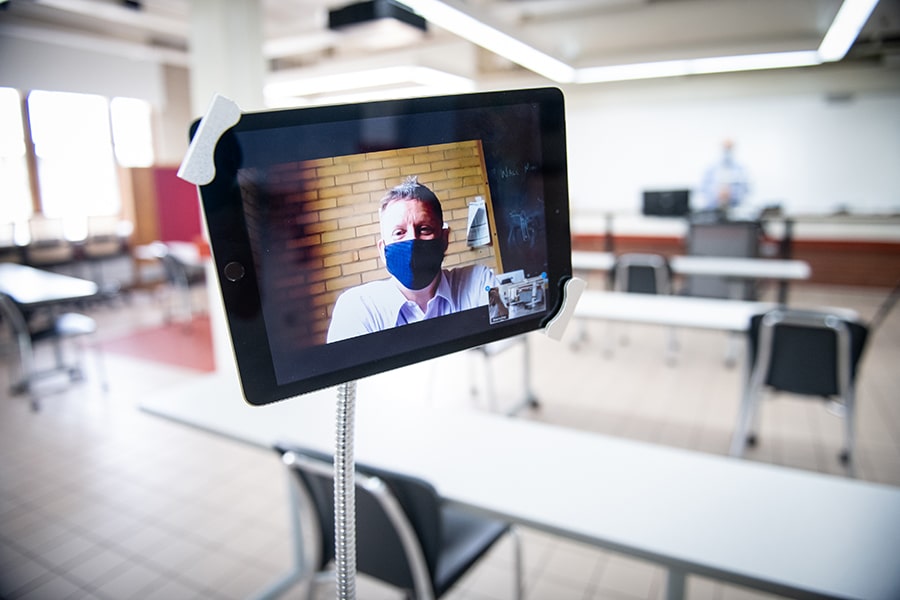 Learning spaces will have technology to allow for in-person and remote instruction.
Learning spaces will have technology to allow for in-person and remote instruction.
Public spaces have been modified to promote physical distancing. More than 250 learning spaces will have technology that allows for both in-person and remote instruction, and all classrooms will allow at least 6 feet between student seating.
Plexiglass
Dozens of plexiglass barriers have been installed in customer-facing locations across campus, such as the University Store, Post Office, Health Services, and many dining locations.
Housing
Residence halls will be operating at 50% capacity. Students were given their preference to live on campus for either the fall or spring semester. There will be no more than one student per bedroom and no more than three students per bathroom fixture set.
Dining
Dining Services is refining offerings and meal plan options that align with evolving health and safety conditions. Students living in university housing will be required to purchase a meal plan as common area kitchens throughout the university and Greek housing have been closed.
Campus Life
Many of the hallmarks of Carnegie Mellon’s campus experience will need to be conducted remotely, however, CMU will continue to deliver a robust set of programs and services that strengthen the Tartan community and support your health and safety. Wherever you elect to study this fall, the CMU experience will be available to you.
Enhanced Cleaning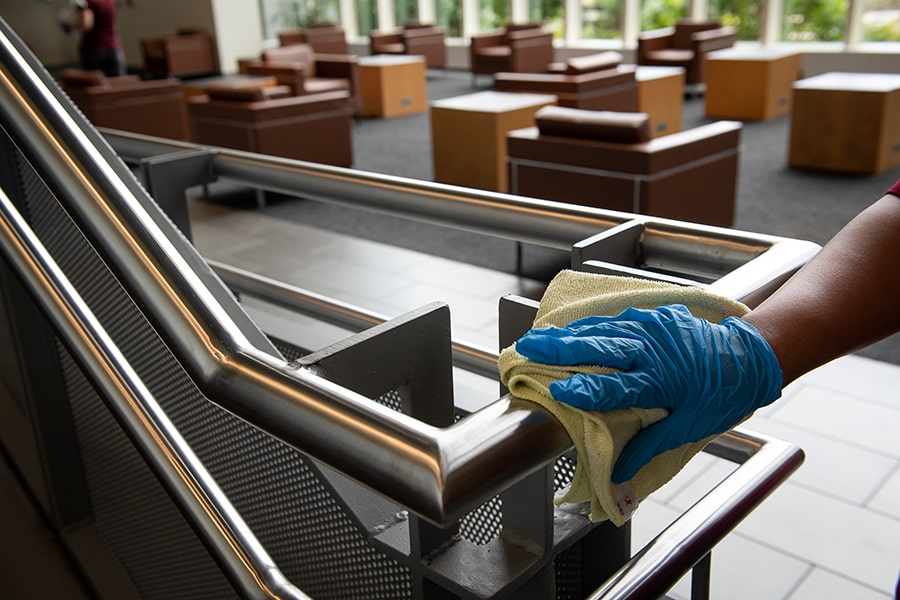 Custodial porters will be on standby to regularly wipe down common areas and high touch surfaces.
Custodial porters will be on standby to regularly wipe down common areas and high touch surfaces.
Common areas, bathrooms and high-touch surface areas are being cleaned and disinfected daily with high-powered hand-held electrostatic sprayers and industrial strength floor scrubbers. Custodial porters will be on standby to regularly wipe down common areas and high touch surfaces in classrooms, restrooms, common areas and dining locations. More than 300 hand sanitizer dispensers have been installed in building lobbies, at exits and entrances, and on major walkways.
Improved HVAC Systems
Steve Guenther explains how changes in the HVAC system are creating healthier environments inside buildings.
The heating, ventilation and cooling (HVAC) systems in two dozen academic buildings have been enhanced in advance of the new semester. Each is getting one of two new technologies designed to create heathier environments. The first system uses a high-intensity, ultraviolet light that would deactivate the coronavirus as it passes through HVAC units. The second technology uses an ionization process to create electrostatic charge in the air to both attack the virus and help filter systems trap the coronavirus, if it exists.
Signs, Signs, Signs
Thousands of posters, floor decals, table tents and other signs have been installed across campus to reinforce physical distancing, promote frequent hand-washing and provide direction, such as where a stairwell is designated as only one-way. “Pause Your Paws” decals are being secured on floors where lines of people typically form as a reminder to maintain 6 feet between yourself and others.
Members of the campus community can order additional signs (PDF), if needed.
Daryl Weinert, CMU’s COVID coordinator, said the above measures are all part of a mitigation strategy, driven by science- and research-based evidence, to reduce the spread of COVID-19.
“We must all adhere to the protocols and requirements that have been put in place to help keep our community safe,” he said. “We will be relying on shared responsibility and we must all do our part. We are all in this together.”
CMU’s COVID-19 website provides the most up-to-date guidance for students and families, faculty, researchers and staff as well as answers to many frequently asked questions.
